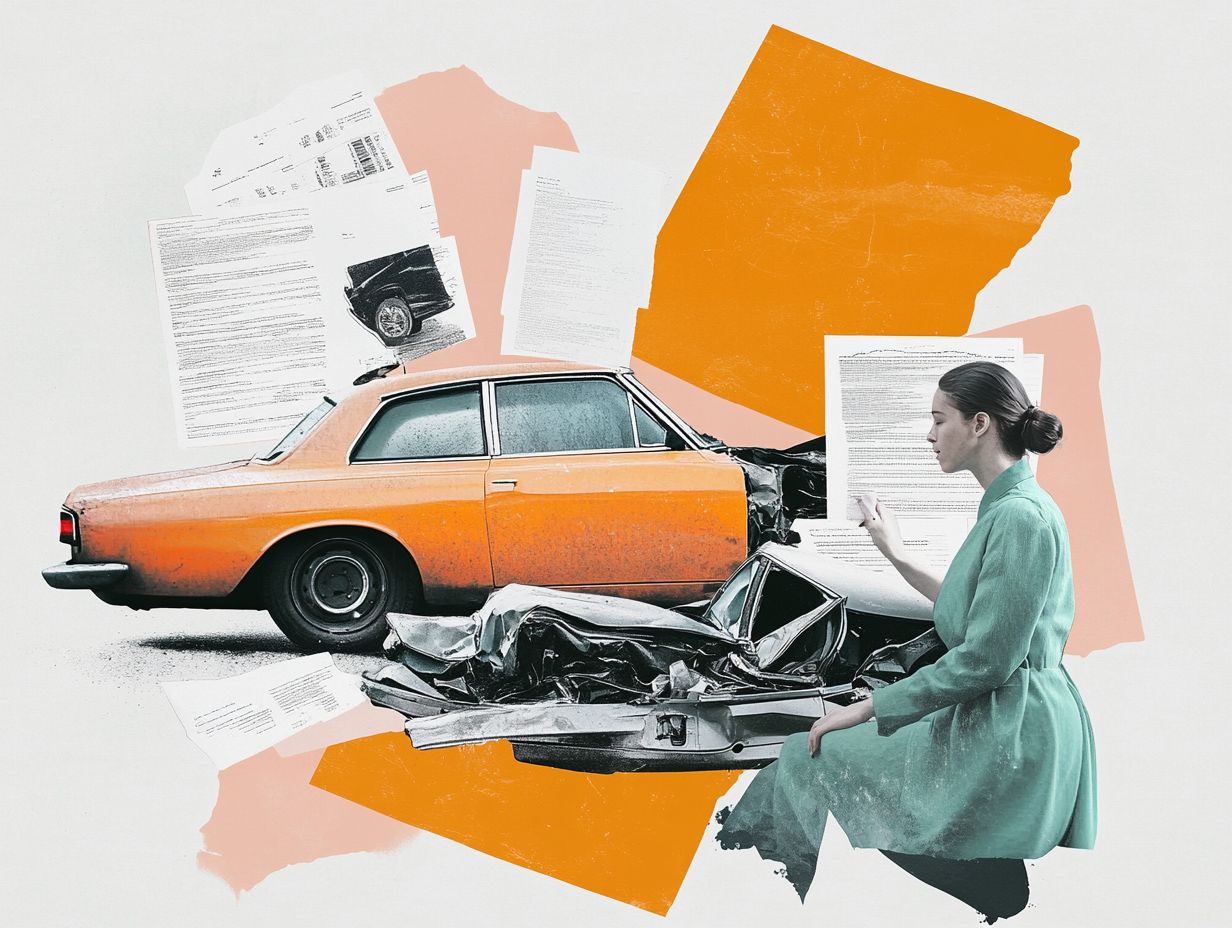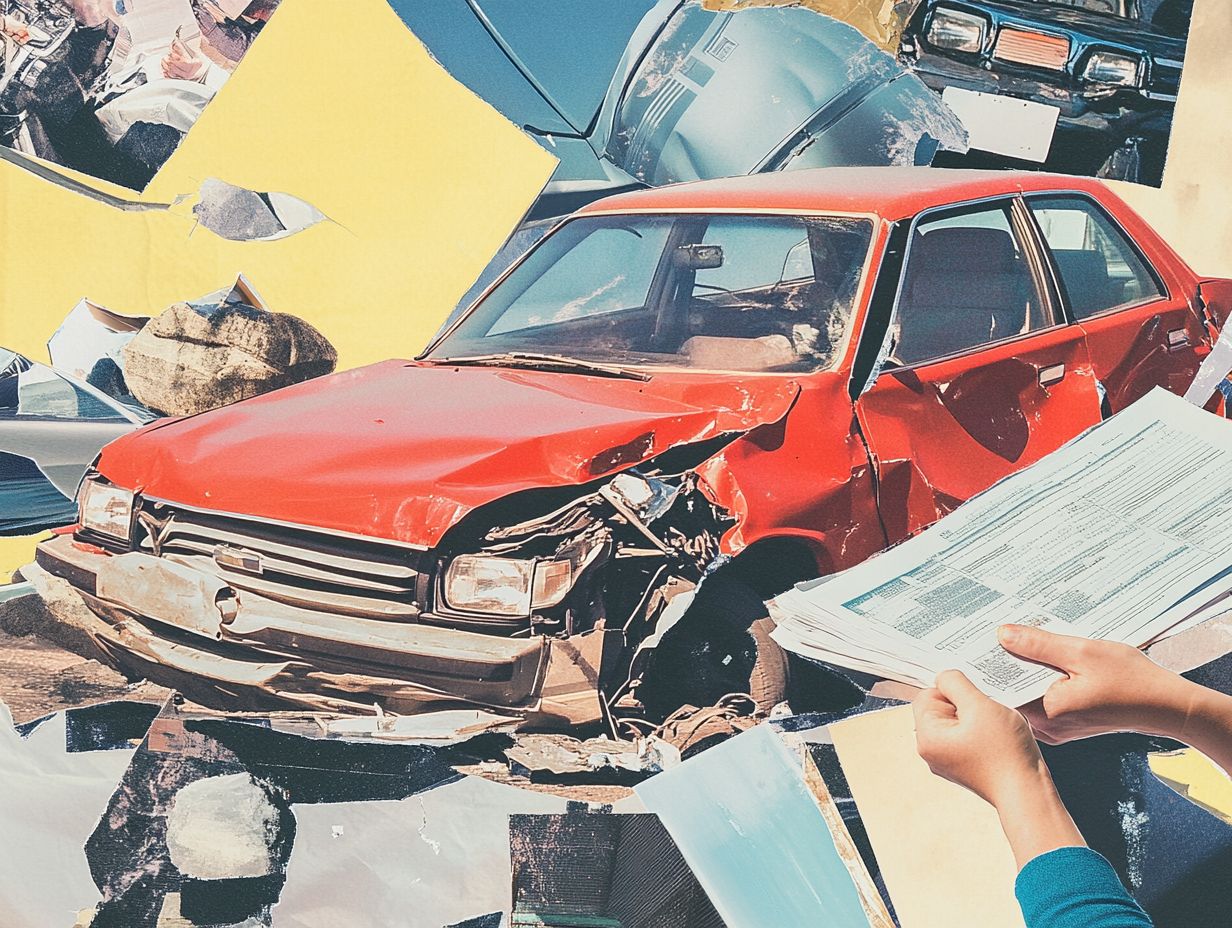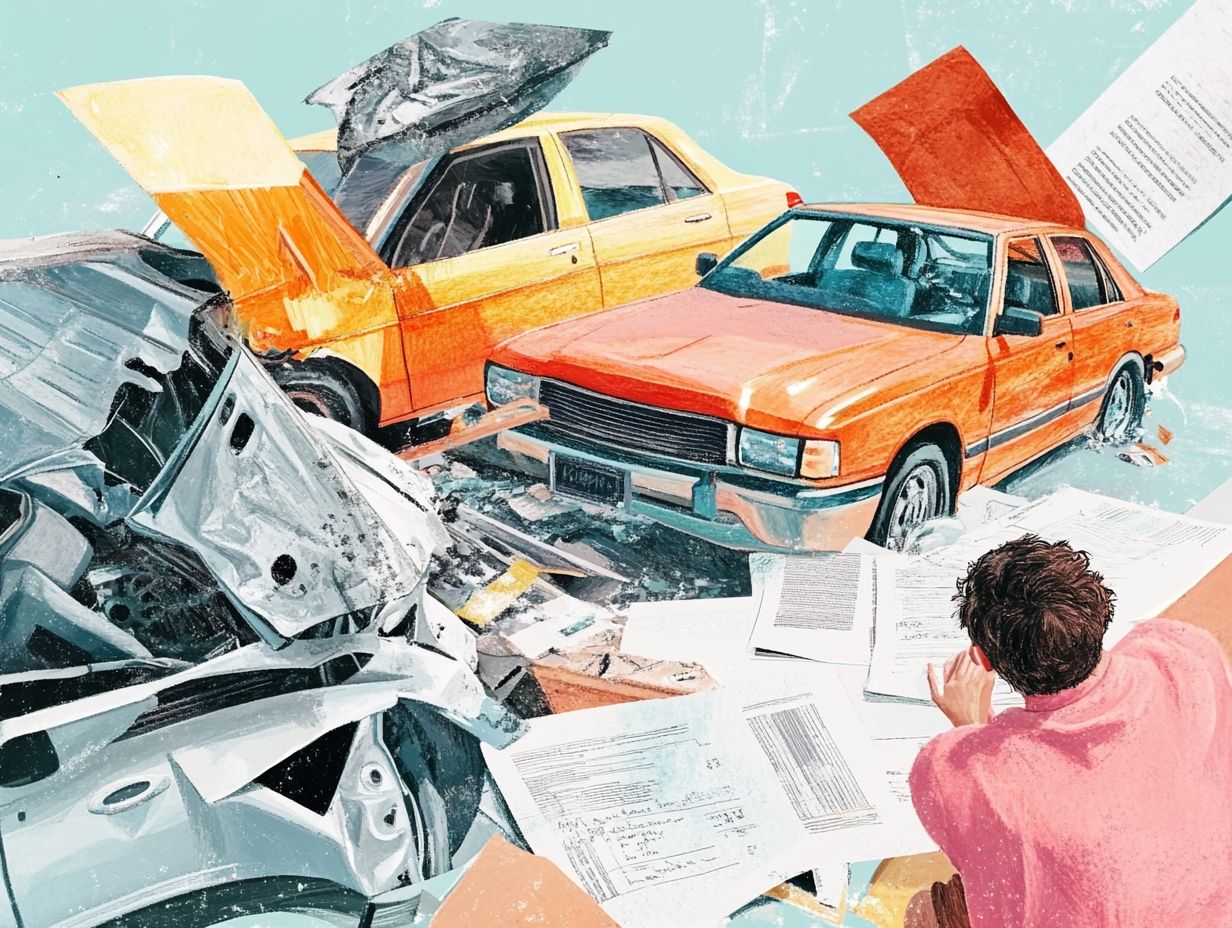What Are Common Auto Insurance Exclusions?
When it comes to auto insurance, understanding the fine print can be a game changer for you. Many drivers tend to gloss over exclusions, leaving themselves exposed when they need coverage the most.
This article delves into essential types of auto insurance exclusions, from named driver clauses to intentional acts, ensuring you re fully aware of what might not be covered.
Key exclusions to keep an eye on are spotlighted, and the discussion centers on how these can affect your overall coverage.
Stay informed and safeguard yourself by understanding the steps to take if you come across exclusions in your policy.
Contents
- Key Takeaways:
- Understanding Auto Insurance Exclusions
- Types of Auto Insurance Exclusions
- Common Exclusions to Look Out For
- Excluded Vehicles
- Excluded Incidents
- How Exclusions Affect Your Coverage
- Limits and Restrictions
- What to Do If You Encounter Exclusions
- Frequently Asked Questions
- What Are Common Auto Insurance Exclusions?
- What are some examples of common auto insurance exclusions?
- Do all auto insurance policies have the same exclusions?
- Can I purchase additional coverage to protect against common auto insurance exclusions?
- What happens if I encounter a common auto insurance exclusion and I don’t have additional coverage?
- How can I avoid encountering common auto insurance exclusions?
Key Takeaways:

- Understand auto insurance exclusions to avoid gaps in your policy and ensure proper coverage.
- Common exclusions include named drivers, permissive use, and intentional acts, which may limit coverage for certain individuals, vehicles, or incidents.
- If you encounter exclusions, review and update your policy or explore alternative coverage options to ensure adequate protection for yourself and your vehicle.
Understanding Auto Insurance Exclusions
Understanding auto insurance exclusions is essential for you as a Texas driver. It ensures that you have comprehensive coverage and safeguards against the financial risks that can arise from accidents and claims.
Exclusions can differ significantly across insurance companies and policies. They impact what s covered in instances of liability or personal injury.
By grasping these nuances, you can adeptly navigate the complexities of your auto insurance. This includes medical expenses, deductibles, and premiums, while avoiding gaps in coverage that could leave you exposed to unforeseen damages.
Types of Auto Insurance Exclusions
As a Texas driver, get to know the exclusions that could impact your policy and available coverage options. Named driver exclusions specifically prevent certain individuals from being covered under your auto insurance policy.
Permissive use exclusions restrict coverage to those who have your explicit permission to use the vehicle. Intentional acts exclusions deny coverage for damages that arise from deliberate actions.
Being fully aware of these provisions is essential for navigating your insurance landscape effectively.
Named Driver Exclusions
A named driver exclusion is a provision in your auto insurance policy that specifically excludes coverage for individuals not explicitly listed as insured drivers. This can lead to unexpected liability gaps for you, the policyholder.
If someone not named on your policy gets into an accident, the insurance company might deny the claim. This leaves you responsible for all damages and medical expenses.
Such exclusions can have serious consequences, especially when family members or friends occasionally borrow your vehicle. It s vital for you to regularly review the driver list on your policy to ensure that anyone who frequently drives your car is included.
By adding those drivers who regularly operate your vehicle, you can protect yourself against unforeseen incidents and potential financial strain. Understanding the specific terms and conditions surrounding named driver exclusions enables you to make informed decisions.
The dynamics of who drives your vehicle and when can significantly influence the risk assessments made by insurers.
Don t risk your coverage understand these exclusions today!
Permissive Use Exclusions
Permissive use exclusions limit coverage to those with your explicit permission. If a friend borrows your car without asking and has an accident, you might be stuck with hefty financial claims.
It’s vital to know these exclusions to avoid surprise costs. For instance, if a family member uses your car for commercial purposes, your coverage could be at risk.
Being aware of these scenarios is critical; it could mean the difference between handling out-of-pocket expenses for vehicle repairs and third-party liabilities or enjoying the peace of mind that comes with comprehensive coverage from your insurer.
Take the time to review your insurance policy thoroughly and ensure all potential drivers are included. This can protect you from misinterpretations and unanticipated costs.
Intentional Acts Exclusions

Intentional acts exclusions deny coverage for damages caused by deliberate harm. If you intentionally damage property while driving, your insurance won’t cover the costs.
It’s vital to know these exclusions. Engaging in risky behavior, like street racing, can lead to denied claims. If you were to vandalize another vehicle, that would also fall under this exclusion.
Routine reviews of your insurance policy will help you comprehend your responsibilities fully, ensuring you don t inadvertently place yourself in a precarious financial position due to misinterpretations of your coverage.
Common Exclusions to Look Out For
When reviewing auto insurance policies in Texas, identify common exclusions that impact your coverage. Focus on excluded drivers, vehicles, and incidents.
Excluded drivers often include those with poor driving records or individuals not listed on your policy. Excluded vehicles can involve cars you own but haven t listed or those used for business purposes.
Certain incidents may also be excluded, such as those resulting from acts of God or deliberate wrongdoing, which can leave you with significant gaps in protection.
Excluded Drivers
Excluded drivers aren’t covered by your policy, posing potential liability risks for you as the primary policyholder in the event of an accident. Common reasons for these exclusions include poor driving records or failing to meet the insurance company s requirements.
This situation can impact both your financial stability and peace of mind. If an excluded driver causes an accident, you might face legal repercussions and increased costs, as your insurance may deny claims.
To manage these exclusions effectively, it s wise for car owners like you to:
- Regularly review your policy documents
- Communicate openly with your insurance provider
- Educate excluded drivers on safe driving practices
By prioritizing a thorough understanding of your policy, you can prevent unexpected pitfalls and ensure that you maintain adequate coverage for all drivers who may operate your vehicle.
Excluded Vehicles
Excluded vehicles are those that your auto insurance policy doesn t cover, which can lead to hefty financial liabilities if an accident occurs. Common exclusions include vehicles you own but haven t listed, rental cars used for business purposes, or modified vehicles that may not be sufficiently covered under standard policies.
These exclusions can greatly impact your overall coverage, leaving you exposed in the event of an accident. If you re driving a borrowed vehicle or a tricked-out car, you might mistakenly believe you’re insured, only to face unexpected expenses.
Know that some insurers have specific rules about vintage cars or vehicles used for racing, which may not qualify for standard coverage. To prevent gaps in your protection, regularly review your insurance policy and discuss your needs with your provider.
This ensures that every vehicle is listed and properly covered, preventing potential liabilities from unforeseen incidents.
Excluded Incidents
Excluded incidents in auto insurance policies refer to specific scenarios that aren t covered, leading to significant liability and financial repercussions. Common examples include accidents resulting from intentional acts or those categorized as natural disasters or events beyond your control, which can damage your vehicle.
Exclusions may also include driving under the influence or using the vehicle for illegal activities. Understanding the limitations of your policy is crucial, as being unaware of these exclusions can lead to unexpected expenses.
Knowing what your auto insurance covers and what it doesn t is vital for maintaining your financial stability. Uncovered incidents can leave you liable for substantial damages.
This awareness can significantly influence your decision-making and ensure that you use your vehicle responsibly.
How Exclusions Affect Your Coverage

Exclusions in auto insurance policies can profoundly influence your overall coverage. They set boundaries and restrictions that define what s included in your liability and protection against damages.
For Texas drivers, understanding these exclusions is crucial to avoid potential gaps in coverage. This ensures robust protection against accidents and unforeseen events.
Limits and Restrictions
Limits and restrictions outlined in auto insurance exclusions can significantly impact your overall protection, especially regarding liability and claims arising from accidents or damages. Understanding the specific limitations within your policy helps you navigate financial risks and ensure you have the right coverage.
Various exclusions such as those pertaining to high-risk drivers, certain vehicle types, or intentional acts can sharply constrain your coverage. These limitations may leave you exposed when it s time to file a claim.
Regularly evaluating your auto insurance policy is essential. Take the time to understand all the exclusions listed and how they affect your potential claims.
Consulting with an insurance agent can clarify these matters and help you identify any gaps in your protection, enabling you to make informed decisions about necessary adjustments or additional coverage.
Potential Gaps in Coverage
Identifying potential gaps in coverage is crucial for you as a policyholder to fully grasp the implications of exclusions in your auto insurance policy, particularly regarding liability and financial risk. These coverage gaps may arise from various exclusions, such as named driver exclusions and intentional acts exclusions, which could leave you vulnerable in critical situations.
Such exclusions can impede your ability to make successful claims when accidents happen or liability issues arise, potentially placing you in a precarious financial position. Being aware of these pitfalls enables you to proactively assess your policy and seek clarification on any ambiguous terms with your insurance provider.
Regularly reviewing your coverage options and considering add-ons or additional coverage plans can be effective strategies for mitigating risk.
Consulting an insurance expert helps you find gaps and offers tailored solutions that align with your unique driving habits and needs.
What to Do If You Encounter Exclusions
When you come across exclusions in your auto insurance policy, it s essential to take a proactive approach. Review and update your coverage to secure maximum protection against potential liabilities.
By understanding the limitations of your current policy, you can effectively explore alternative coverage options that align with your specific needs, ensuring that any coverage gaps left by existing exclusions are adequately addressed.
Reviewing and Updating Your Policy
Regularly reviewing your auto insurance policy is essential to protect yourself! This process ensures you have adequate coverage and are aware of any exclusions that could affect your financial liability. It enables you to identify areas for improvement and ensures that your policy accurately reflects your current situation, including any changes to your vehicle or driving habits.
Start by examining the terms of your existing policy, paying special attention to any exclusions that might not be immediately obvious. For example, scenarios like using your car for ridesharing or neglecting proper vehicle maintenance can create coverage gaps. As your life changes whether it’s acquiring a new car, relocating, or adjusting your driving frequency don t wait! Reassess your coverage limits and premiums now to stay protected.
Consider reaching out to an insurance agent for expert guidance; they can help customize your policy to better align with evolving risks and ensure you re not facing overlaps or unnecessary costs.
Exploring Alternative Coverage Options

Exploring alternative coverage options can offer you enhanced protection as a Texas driver, especially if your auto insurance policy has exclusions that leave you financially exposed. This may involve seeking additional coverage like uninsured motorist protection, comprehensive coverage, or specialized policies designed for unique driving situations.
By carefully considering these alternatives, you can tailor your insurance plan to better align with your lifestyle and specific risks. For instance, if you frequently navigate high-risk areas, you might find that enhanced roadside assistance is a worthwhile investment. Meanwhile, if you own a custom vehicle, opting for policies that cover aftermarket modifications could be essential.
Looking into options like gap insurance, which covers the difference between what you owe on your car and its actual cash value, ensures that, in the event of a total loss, the financial burden doesn t rest solely on your shoulders. Customizing your coverage not only provides peace of mind but also guarantees that you have thoughtfully addressed every potential scenario.
Frequently Asked Questions
What Are Common Auto Insurance Exclusions?
Are you aware of what your policy doesn t cover? Auto insurance exclusions refer to situations or events that are not covered by your auto insurance policy. Exclusions can differ based on your insurance provider, but there are some common exclusions typically found in most policies.
What are some examples of common auto insurance exclusions?
Some common auto insurance exclusions include intentional damage or illegal activities, driving while under the influence of drugs or alcohol, using your vehicle for commercial purposes, and racing or other high-risk activities. To learn more about these exclusions, check out what are common exclusions in policies.
Still have questions? Here are some common inquiries about auto insurance exclusions.
Do all auto insurance policies have the same exclusions?
No, not all auto insurance policies have the same exclusions. Review your policy closely to understand what is covered and what is not.
Can I purchase additional coverage to protect against common auto insurance exclusions?
Yes, you can buy extra coverage for common exclusions. Protect yourself! Adding options like collision, comprehensive, and uninsured motorist coverage can save you from unexpected costs.
What happens if I encounter a common auto insurance exclusion and I don’t have additional coverage?
If you face an exclusion without extra coverage, your claim may be denied. You’ll then need to pay for the excluded costs yourself.
How can I avoid encountering common auto insurance exclusions?
To avoid exclusions, carefully review your policy. Follow traffic laws and drive safely to prevent issues related to illegal activities.






